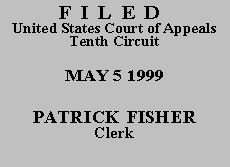 UNITED STATES
COURT OF APPEALS
UNITED STATES
COURT OF APPEALS
 UNITED STATES
COURT OF APPEALS
UNITED STATES
COURT OF APPEALS
TENTH CIRCUIT
| FERMAN JONES,
Plaintiff-Appellant, v. SGT. TRAWICK, Defendant-Appellee. |
No. 98-6352 (D.C. CIV-97-2050-M) (Western District of Oklahoma) |
ORDER AND JUDGMENT(*)
Before SEYMOUR, Chief Judge, BALDOCK, and HENRY, Circuit Judges.
After examining the briefs and appellate record, this panel has determined unanimously that oral argument would not materially assist the determination of this appeal. See Fed. R. App. P. 34(a); 10th Cir. R. 34.1(G). The case is therefore ordered submitted without oral argument.
Mr. Jones, proceeding pro se, appeals the district court's dismissal of his employment discrimination action without prejudice, conditioned on his payment to defendant, prior to re-filing, of defendant's attorney's fees in the sum of $4,967.00. The district court also denied him leave to proceed in forma pauperis (IFP) on appeal, finding that his appeal was legally frivolous and not taken in good faith. Mr. Jones renews his motion for in forma pauperis status on appeal. We deny his motion to proceed IFP on appeal and dismiss his appeal.
The district court dismissed Mr. Jones' claim without prejudice, requiring him to pay defendant's attorney's fees prior to re-filing, because Mr. Jones had twice failed to appear at his scheduled deposition, had failed to attend or participate in court-ordered mediation despite having agreed to such mediation at the scheduling conference, and had engaged in written ex parte communications with the district judge in violation of court rules. Mr. Jones argues the court unfairly dismissed his action. We review the district court's imposition of sanctions on a party who violates court rules or fails to follow orders of the court for abuse of discretion. See M.M. v. Zavaras, 139 F.3d 798, 802 (10th Cir. 1998). Under the Western District of Oklahoma's Local Rule 16.1, the district court is authorized to issue any sanction "the Court . . . deem[s] just and appropriate" for a party's "failure to participate in [pre-trial proceedings in] good faith." Permissible sanctions include issuing a default judgment or assessing expenses and fees. W.D.OK.LR16.1. Further, under Fed. R. Civ. P. 37(d), when a party fails to appear at his own deposition, the district court is authorized both to dismiss the action and to "require the party . . . to pay the reasonable expenses, including attorney's fees, caused by the failure unless the court finds that the failure was substantially justified or that other circumstances make an award of expenses unjust."
Here, although Mr. Jones suggests that he needed additional time to secure information, he does not proffer any reasoned justification for his failure to comply with the court rules or to attend his scheduled deposition. While we are obliged to construe pro se pleadings liberally, pro se litigants "must follow the same rules of procedure that govern other litigants." Green v. Dorrell, 969 F.2d 915, 917 (10th Cir. 1992). "Although dismissal is indeed a drastic sanction, we have repeatedly upheld dismissals in situations where the parties themselves neglected their cases or refused to obey court orders." Id. Thus, the district court's sanction of dismissal without prejudice subject to payment of attorney's fees was not an abuse of its discretion.
Further, we agree with the district court that, as Mr. Jones has merely repeated his conclusory allegations without providing any justification for his failure to comply with the court's orders and rules, his appeal is frivolous and not presented in good faith.
Therefore, we DENY Mr. Jones' motion to proceed IFP and DISMISS his appeal.
Entered for the Court,
Robert H. Henry
Circuit Judge
*. This order and judgment is not binding precedent, except under the doctrines of law of the case, res judicata, and collateral estoppel. The court generally disfavors the citation of orders and judgments; nevertheless, an order and judgment may be cited under the terms and conditions of 10th Cir. R. 36.3.